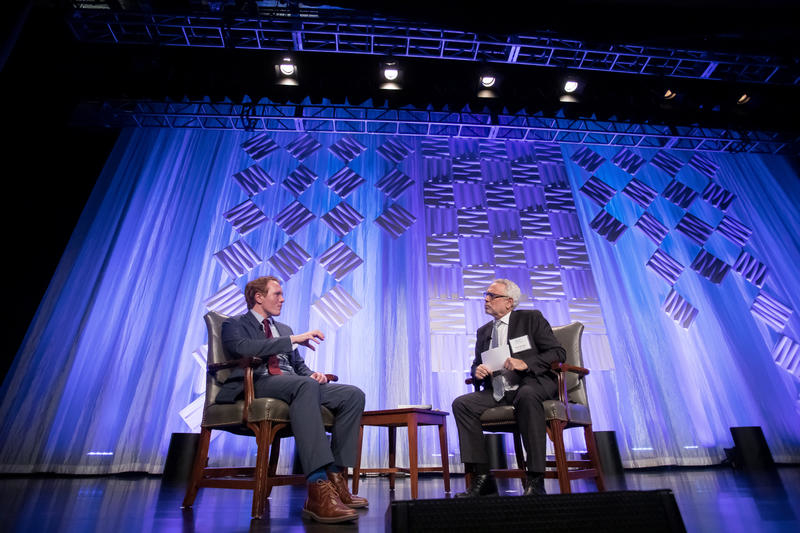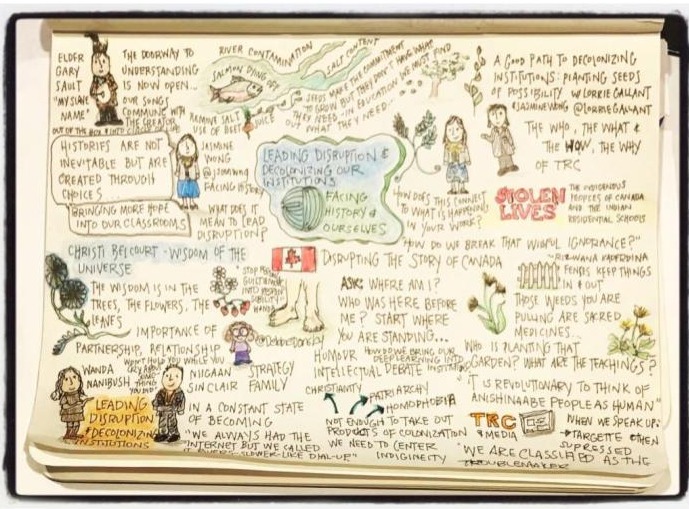Facing History and Ourselves Canada will be running some amazing professional development seminars throughout Canada this summer. Below is the information for all of the upcoming seminars, as well as the link to find out even more information on each seminar.
Topics: Professional Development, Summer Seminar, Holocaust and Human Behaviour, stolen lives
Creating Meaningful Responses to Memoir and Engaging in Reciprocity
Posted by Alysha Groff on June 21, 2019
This spring, Facing History and Ourselves, in partnership with the Azrieli Foundation Holocaust Survivors Memoir Program, invited 175 students from 6 schools to layer onto their learning about the history and legacies of the Holocaust, or of Canada's Residential Schools by reading Survivor memoir. Students read Theodore Fontaine’s Memoir Broken Circle: The Dark Legacy of Indian Residential Schools, or excerpts of Nate Leipciger’s Memoir The Weight of Freedom, then created pieces that reflected their understanding and responses to these testimonies, which were gifted to each Survivor.
Topics: Toronto, Holocaust, Memoir, Facing History and Ourselves, Survivor Testimony, Canada, Residential Schools, Canadian History, Student Work, project, genocide, Holocaust and Human Behaviour, reflection, Connected Learning, Grade 10 History, HSB, CHC, difficult conversations, trc, stolen lives, facing history pedagogy, Azrieli Foundation Memoirs, Decolonizing Schools, Holocaust History in Canada, Facing Canada, cross curricular teaching and learning, collaborative inquiry
Ideas and Insights: A Discussion on Decolonizing and Indigenizing Classrooms, Schools and Systems
Posted by Jasmine Wong on May 28, 2019
On March 31st, 2019, Facing History and Ourselves in collaboration with the Art Gallery of Ontario partnered with Durham District School Board, Kawartha Pine Ridge District School Board, Peel District School Board, Toronto District School Board, Toronto Catholic District School Board and York Region District School Board to host a day long educator conference to discuss ways educators and institutional leaders have worked, and can work to decolonize and Indigenize education.
Topics: Indigenous, Decolonizing Schools
Leading Disruption and Decolonizing Education: Wanda Nanibush in Conversation with Niigaanwewidam Sinclair
Posted by Jasmine Wong on May 28, 2019
On March 31st, Facing History and Ourselves, in collaboration with the Art Gallery of Ontario invited University of Manitoba scholar Niigaanwewidam Sinclair and Art Gallery of Ontario Curator Wanda Nanibush to discuss institutional disruption, decolonization and Indigenization, as part of a day-long conference for educators. This event was recorded and can be viewed here.
Finding the Words to Speak After Trauma: Remembering Donia Blumenfeld Clenman
Posted by Jasmine Wong on May 27, 2019
In the Aftermath Project, director Sarah Terry reminds us that war is only half the story: "To be fully informed, we have to know the stories of post-conflict." It is in these stories, "where we are constantly redefining what it means to be human, what it means to live again, to rebuild civil society, to recover from trauma. If we don't know these stories, then we don't really understand the world we live in, and we will repeat history again and again and again." Through her poetry, Holocaust survivor Donia Blumenfeld Clenman conveyed some of these essential stories of the aftermath of genocide. With clarity, humanity and gentleness, her words connect us to her struggles, and teach us what it means to face - and recover - from trauma. In the month of her passing, we remember her legacy and honour her words.
Topics: Poetry, Survivor Testimony, Judgement and Legacy, difficult conversations, Holocaust History in Canada
This is part two of Amy Smith’s Blog The Road to Equity: How do you define equity? In part one she discussed her own learning journey of gaining additional knowledge about groups identified as in need of more support in schools in the equity and inclusion branch of Peel Board’s five year School Success Plan. All of her reading and learning encouraged her “to really reflect on the life I was living, and the privileges I have that I was not even aware of simply because I was born in a white, abled, cisgender body.” In part two she will cover how she took her own learning and expertise to help other educators start their journey, to start learning about who they are as people and how their privilege and bias impacts their students.
Topics: Teachers, Culturally Responsive and Relevant Pedagogy, big paper, Equity in Education, positionality, collaborative inquiry
Unlearning Hate: Responding to the Rise of White Nationalism
Posted by Margaret Wells on April 26, 2019
On Monday May 6, 2019 Facing History and Ourselves Canada is celebrating our tenth anniversary with a program called Unlearning Hate: A Conversation with Derek Black and Allison Gornik at the Toronto Centre for the Arts.
Topics: Antisemitism, difficult conversations, apologies, Facing Canada, white supremacy, islamophobia
Balancing the Responsibility to Disrupt and Decolonize with the Reality of my own Whiteness
Posted by Dr. Debbie Donsky on April 23, 2019
Topics: Truth and Reconciliation, Indigenous History, Culturally Responsive and Relevant Pedagogy, Indigenous, difficult conversations, trc, stolen lives, settler eucators, Treaty, Sacred Circle Teachings, Decolonizing Schools, Facing Canada
“Those who do not learn history are doomed to repeat it.” How many of us have heard this quote or a variation of it? Sayings like these are repeated so often nowadays that they have lost meaning. People will complain, “I don’t need you to lecture me, I already know all this,” “The past is the past, leave it behind where it belongs,” or a blatant dismissal from those who are so cemented in the now, that they refuse to see the truth right in front of them.
Topics: Student Voices, Choosing to Participate, Armenian Genocide, Students, Facing History and Ourselves, Holocaust Education, Rwanda, Student Work, Genocide and Crimes Against Humanities Course, Equity in Education, Facing Canada
A Mindful Classroom: Establishing a Safe Space for Sensitive Topics
Posted by Heidi Crowley on March 26, 2019
A Mindful Classroom: Establishing A Safe Space for Sensitive Topics
Many of us have seen the importance of mindfulness in our classrooms and personal lives. Being present and aware are integral to truly absorbing what is around you. How mindful are we of exactly what is around us in the classroom? The physical space we build for our students is often an afterthought to efficiency and more intangible metrics of behaviour and dynamics. This year, I made it my goal to be mindful of the materials within my classroom and how well they represent the values I hope we exercise within these walls.
Topics: Art, Student Work, Indigenous History, Social and Emotional Learning, Middle School, Culturally Responsive and Relevant Pedagogy, facing history pedagogy, Treaty, Facing Canada, cross curricular teaching and learning

.jpeg)
.jpeg)
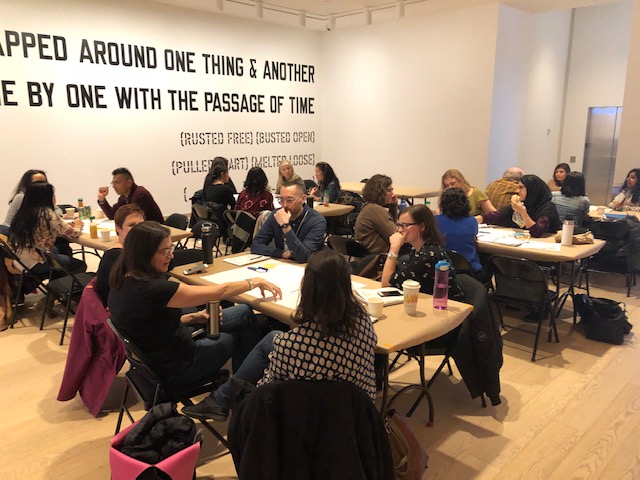
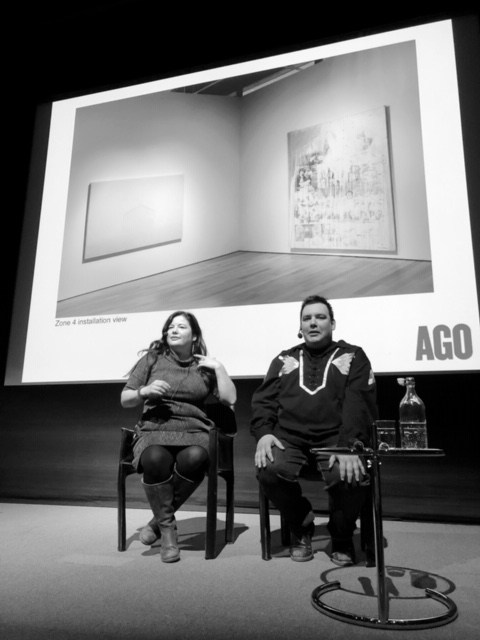
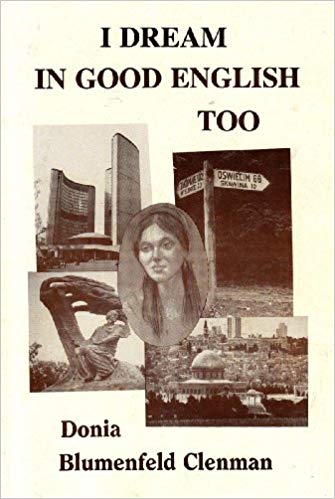
.jpeg)
